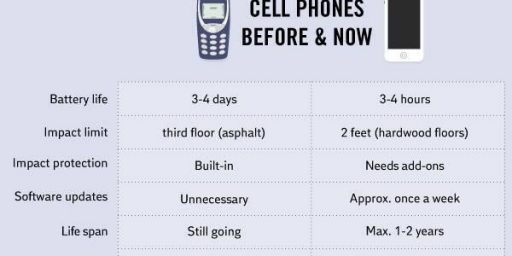Schools Relax Cellphone Bans
Schools Relax Cellphone Bans, Nodding to Trend (NYT) [RSS]
Sitting in his second-period computer class at Eastern High School, Gray Taylor, 15, felt his cellphone vibrate. To avoid being caught by the teacher, he answered quietly – and discovered an unexpected caller. “Why are you answering the phone in class?” Gray’s mother asked. He whispered back, “You’re the one who called me.” His mother said she had intended to leave a question on Gray’s voice mail. Such scenes are playing out across the country, as hundreds of high schools have reluctantly agreed to relax their rules about cellphones in schools. Rather than banning the phones outright, as many once did, they are capitulating to parent demands and market realities, and allowing students to carry phones in school – though not to use them in class. The reversal is a significant change from policies of the 1990’s, when school administrators around the country viewed cellphones as the tools of drug dealers. In Florida, carrying a cellphone in school could be punishable by a 10-day suspension. In Louisiana, it was deemed a crime, with a potential penalty of 30 days in jail.
But now the phones have become tools used by parents to keep in touch with, and keep track of, their children. And schools are facing a more basic reality: it is no longer possible to enforce such bans. Thanks to the falling prices of mobile phones, and the aggressive efforts by carriers to market “family plans” to parents and teenagers, the phones have become so commonplace that trying to keep them out of schools would be like trying to enforce a ban on lip gloss or combs.
Over the last two years, more than half a dozen states, including Georgia, Louisiana, Maryland, Michigan and Nevada, and numerous individual school districts, have either abolished or relaxed their bans. In June, Gov. Jeb Bush of Florida signed a law, based on a proposal forwarded to the Legislature by a group of high school students, to no longer make possession of a phone in school a felony and leave punishment up to counties. Since July, half of Kentucky’s district’s have rescinded a ban on outright possession.
Interesting. There’s no conceivable reason for students to carry cell phones to class. I can understand why it might be convenient to have them in their lockers (or cars, for older students) so that they could call their folks during lunchtime or after school, although I somehow managed to finish twelve years of school without needing to call the folks. The idea that parents suddenly need to be in 24/7 communication with their children–in an era where parents seem strangely unable to instill discipline in said children–is one I find remarkable.




It’s kind of like when you forget your cellphone, and the person who you were on your way to pick up FREAKS OUT because they called you eighty times and you didn’t answer. How did they survive a decade ago?
>> There’s no conceivable reason for students to carry cell phones to class.
I can think of several:
They might not have lockers.
The lockers might not be secure enough for valuables.
They might not have cars.
They might not have time to walk to their lockers to check messages during a short class change interval.
Bruce, if your reasons apply then I say, “turn the phone off during school.” If the parent needs to get in touch with their child, call the office.